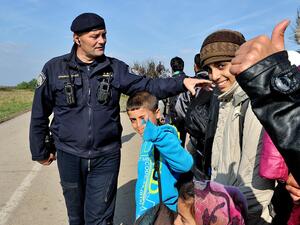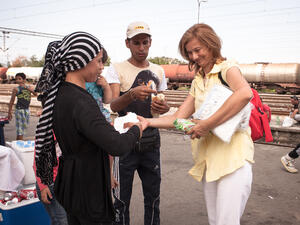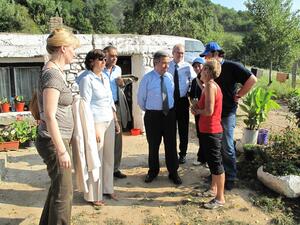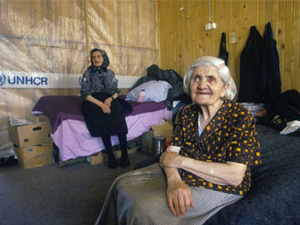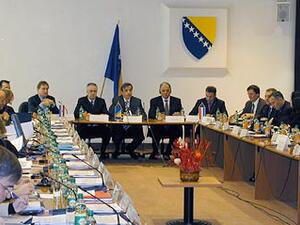Statement of Mr Jacques Mouchet, UNHCR Co-ordinator of the South-eastern Europe Operation, at the meeting of Working Table I of the Stability Pact
Statement of Mr Jacques Mouchet, UNHCR Co-ordinator of the South-eastern Europe Operation, at the meeting of Working Table I of the Stability Pact
Ladies and Gentlemen, distinguished delegates,
At the Humanitarian Issues Working Group and at previous meetings of this Working Table, UNHCR, as sponsor organisation of the Task Force on Refugees and Displaced Persons (HIWG), has presented its pragamatic, regional approach to finding solutions for refugees and displaced persons.
Today, together with the Governments of Bosnia and Herzegovina and Croatia, supported by UNHCR, will formally demonstrate we are realising this project-oriented approach by presenting a number of proposals related to the return of refugees and IDPs to their homes of origin.
These project proposals are indeed timely, as a more favourable climate nowadays prevails in the region concerned by Dayton implementation. Fresh commitment to promote return has been expressed by the newly elected Croatian leadership. Many groups of refugees that have been hesitant until now, have recently manifested their intention to return home, if proper conditions are created ; during the last months, Bosnia and Herzegovina has witnessed an increase in minority returns, most remarkably to areas previously considered as particularly difficult dominated by hard-liners.
These initial projects stem from the common premise that the identification of available solutions must be based on the actual wishes of refugees and displaced persons. As such, they focus on identified groups of displaced who have elected return as their preferred option.
A second new rationale is not only to facilitate the physical return of refugees and displaced persons to their homes, but to create the conditions for their succesful reintegration into the society of their countries and areas of origin. The concepts of sustainability and self-suffiency are therefore key to this approach.
Finally, the « jobs for cohexistence » initiative announced at the HIWG has inspired the authors of these proposals. Reconstruction, development and job creation activities targeting return areas will closely follow return in order to create an environment conducive to succesful reintegration. Under such schemes, economic revitalization will benefit not only the minority returnee population, but the entire community. This approach will create reduce competition for scarse resources and job opportunities, and foster er peacefull multi-ethnic co-existence multi-ethnic co-existence.
To elaborate on each of these proposals, the first two clusters of projects pertain to Bosnia and Herzegovina. They are sub-divided in a first group of 48 projects for inter-entity minority return of internally displaced persons within Bosnia and Herzegovina, and a second group of 16 projects for the voluntary repatriation of refugees from Croatia and from the Federal Republic of Yugoslavia.
In Bosnia and Herzegovina, the projects have been developed by the respective Government authorities, in consultation with UNHCR, and facilitated by the Return and Reconstruction Task Force (RRTF) field offices, including United Nations and other International Organisations. Particular care has been taken to engage Municipal authorities in the preparation of the proposals and to ensure that the receiving Municipalities fully support the return initiatives.
Those consultations have also led to an agreement with all parties concerned that the procedural aspects of refugee repatriation will be simplified.
These projects represent some 200 million DeutschMarks in investment opportunities with projects ranging from 20,000 to 200,000 Deutsch Marks each. They target an estimated number of 32,000 minority and refugee returns among a total of 265,000 beneficiaries in the communities of return areas as a whole.
The economic activities mentioned in the project proposals will obviously require additional feasibility studies and further technical development, however they do indicate some immediate possibilities for potential investment.
The project proposals are designed to take advantage of the existing implementation capacity throughout the country, and will also utilize the expertise of non-governmental organisations which have been working in Bosnia and Herzegovina for many years.
With a well functioning co-ordination and monitoring system already in place, it is expected that these initial return projects will, with adequate and timely funding, contribute to a considerable increase in sustainable minority returns in 2000.
With regards to Croatia, the proposal from the Government targets a returnee beneficiary population of some 16,500 individuals, corresponding approximately to some 8,500 families, who wish to return from the Federal Republic of Yugoslavia and from Bosnia and Herzegovina.
Overall, the plan encompasses activities specifically providing for repair and reconstruction of damaged and destroyed properties, repossession of occupied homes, host-family allowances as well as rehabilitation of physical infrastructure, income-generation activities and job creation.
Given the age breakdown of the current population of repatriation applicants, the improved economic situation created by project implementation would play a crucial role in attracting younger returnees.
The estimated budget is 55.6 million US$. However, while the initial budget includes activities to create basic conditions for return and reintegration, it does not yet include funds needed for infrastructure rehabilitation and more development-oriented activities to support employment. The total budget will therefore increase when more precise data about these additional sectors of intervention will be available.
Given the age breakdown of the current population of repatriation applicants, the improved economic situation created by project implementation would play a crucial role in attracting younger returnees.
UNHCR is holding discussions with the Stability Pact Secretariat regarding the establishment of an ad hoc Steering Group in Bosnia and Herzegovina and Croatia for the funding and implementation of these and other future return projects. This Group will provide a mechanism for matching donors with projects and will also facilitate reporting back to Working Table I on the progress achieved.
I will conclude by reminding you that your endorsement of these projects and the full support of States and Organisations under Working Table I is essential to ensure that adequate funding is made available at an early stage for the succesful implementation of such return initiatives.
Thank you


